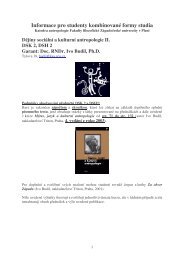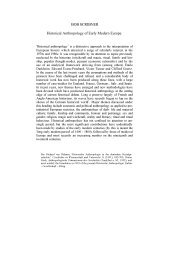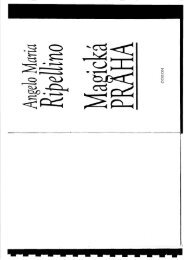THE REVIVAL OF NARRATIVEtrying out new methods, and searching for new sources. Now they areturning back to the telling <str<strong>on</strong>g>of</str<strong>on</strong>g> stories. <str<strong>on</strong>g>The</str<strong>on</strong>g>re are, however, five differencesbetween their stories and those <str<strong>on</strong>g>of</str<strong>on</strong>g> the traditi<strong>on</strong>al narrativehistorians. First, they are almost without excepti<strong>on</strong> c<strong>on</strong>cerned withthe lives and feelings and behaviour <str<strong>on</strong>g>of</str<strong>on</strong>g> the poor and obscure ratherthan the great and powerful. Sec<strong>on</strong>dly, analysis remains as essential totheir methodology as descripti<strong>on</strong>, so that their books tend to switch, alittle awkwardly, from <strong>on</strong>e mode to the other. Thirdly, they are openingup new sources, <str<strong>on</strong>g>of</str<strong>on</strong>g>ten records <str<strong>on</strong>g>of</str<strong>on</strong>g> criminal courts which usedRoman law procedures, since these c<strong>on</strong>tain written transcripts <str<strong>on</strong>g>of</str<strong>on</strong>g> thefull testim<strong>on</strong>y <str<strong>on</strong>g>of</str<strong>on</strong>g> witnesses under interrogati<strong>on</strong> and examinati<strong>on</strong>. (<str<strong>on</strong>g>The</str<strong>on</strong>g>other fashi<strong>on</strong>able use <str<strong>on</strong>g>of</str<strong>on</strong>g> criminal records, to chart the quantitative riseand fall <str<strong>on</strong>g>of</str<strong>on</strong>g> various types <str<strong>on</strong>g>of</str<strong>on</strong>g> deviance, seems to me to be an almostwholly futile endeavour, since what is being counted is not the number<str<strong>on</strong>g>of</str<strong>on</strong>g> perpetrated crimes, but criminals who have been arrested andprosecuted, which is an entirely different matter. <str<strong>on</strong>g>The</str<strong>on</strong>g>re is no reas<strong>on</strong> tosuppose that the <strong>on</strong>e bears any c<strong>on</strong>stant relati<strong>on</strong>ship over time to theother.) Fourthly, they <str<strong>on</strong>g>of</str<strong>on</strong>g>ten tell their stories in a different way fromthat <str<strong>on</strong>g>of</str<strong>on</strong>g> Homer, or Dickens, or Balzac. Under the influence <str<strong>on</strong>g>of</str<strong>on</strong>g> themodern novel and <str<strong>on</strong>g>of</str<strong>on</strong>g> Freudian ideas, they gingerly explore the subc<strong>on</strong>sciousrather than sticking to the plain facts. And under the influence<str<strong>on</strong>g>of</str<strong>on</strong>g> the anthropologists, they try to use behaviour to reveal symbolicmeaning. Fifthly, they tell the story <str<strong>on</strong>g>of</str<strong>on</strong>g> a pers<strong>on</strong>, a trial or adramatic episode, not for its own sake, but in order to throw light up<strong>on</strong>the internal workings <str<strong>on</strong>g>of</str<strong>on</strong>g> a past culture and society.vIf I am right in my diagnosis, the movement to narrative by the"new historians" marks the end <str<strong>on</strong>g>of</str<strong>on</strong>g> an era: the end <str<strong>on</strong>g>of</str<strong>on</strong>g> the attempt toproduce a coherent scientific explanati<strong>on</strong> <str<strong>on</strong>g>of</str<strong>on</strong>g> change in the past.Ec<strong>on</strong>omic and demographic determinism has collapsed in the face <str<strong>on</strong>g>of</str<strong>on</strong>g>the evidence, but no full-blown deterministic model based <strong>on</strong> politics,psychology or culture has emerged to take its place. Structuralism andfuncti<strong>on</strong>alism have not turned out much better. Quantitative methodologyhas proved a fairly weak reed which can <strong>on</strong>ly answer a limitedset <str<strong>on</strong>g>of</str<strong>on</strong>g> problems. Forced into a choice between a priori statisticalmodels <str<strong>on</strong>g>of</str<strong>on</strong>g> human behaviour, and understanding based <strong>on</strong> observati<strong>on</strong>,experience, judgement and intuiti<strong>on</strong>, some <str<strong>on</strong>g>of</str<strong>on</strong>g> the "new historians" arenow tending to drift back towards the latter mode <str<strong>on</strong>g>of</str<strong>on</strong>g> interpreting thepast.Although the revival by the "new historians" <str<strong>on</strong>g>of</str<strong>on</strong>g> the narrative modeis a very recent phenomen<strong>on</strong>, it is merely a thin trickle in comparis<strong>on</strong>with the c<strong>on</strong>stant, large and equally distinguished output <str<strong>on</strong>g>of</str<strong>on</strong>g> descriptivepolitical narrative by more traditi<strong>on</strong>al historians. A recentexample which has met with c<strong>on</strong>siderable scholarly acclaim is Sim<strong>on</strong>I9
2o PAST AND PRESENT NUMBER 85Schama's book about Dutch politics in the eighteenth century.32Works such as this have for decades been treated with indifference orbarely c<strong>on</strong>cealed disdain by the new social historians. This attitude didnot have very much justificati<strong>on</strong>, but in recent years it has stimulatedsome <str<strong>on</strong>g>of</str<strong>on</strong>g> the traditi<strong>on</strong>al historians to adapt their descriptive mode toask new questi<strong>on</strong>s. Some <str<strong>on</strong>g>of</str<strong>on</strong>g> them are no l<strong>on</strong>ger so preoccupied withissues <str<strong>on</strong>g>of</str<strong>on</strong>g> power and therefore with kings and prime ministers, warsand diplomacy, but are, like the "new historians", turning their attenti<strong>on</strong>to the private lives <str<strong>on</strong>g>of</str<strong>on</strong>g> quite obscure people. <str<strong>on</strong>g>The</str<strong>on</strong>g> cause <str<strong>on</strong>g>of</str<strong>on</strong>g> thistrend, if trend it be, is not clear but the inspirati<strong>on</strong> seems to be thedesire to tell a good story, and in so doing to reveal the quirks <str<strong>on</strong>g>of</str<strong>on</strong>g>pers<strong>on</strong>ality and the inwardness <str<strong>on</strong>g>of</str<strong>on</strong>g> things in a different time andculture. Some traditi<strong>on</strong>al historians have been doing this for sometime. In I 958 G. R. Elt<strong>on</strong> published a book c<strong>on</strong>sisting <str<strong>on</strong>g>of</str<strong>on</strong>g> stories <str<strong>on</strong>g>of</str<strong>on</strong>g> riotand mayhem in sixteenth-century England, taken from the records<str<strong>on</strong>g>of</str<strong>on</strong>g> Star Chamber.33 In 1946 Hugh Trevor-Roper brilliantly rec<strong>on</strong>structedthe last days <str<strong>on</strong>g>of</str<strong>on</strong>g> Hitler.34 Just recently he has investigatedthe extraordinary career <str<strong>on</strong>g>of</str<strong>on</strong>g> a relatively obscure English manuscriptcollector,c<strong>on</strong>-man and secret pornographer, who lived in China in theearly years <str<strong>on</strong>g>of</str<strong>on</strong>g> this century.35 <str<strong>on</strong>g>The</str<strong>on</strong>g> purpose <str<strong>on</strong>g>of</str<strong>on</strong>g> writing this entertainingyarn seems to have been sheer pleasure in story-telling for its ownsake, in the pursuit and capture <str<strong>on</strong>g>of</str<strong>on</strong>g> a bizarre historical specimen. <str<strong>on</strong>g>The</str<strong>on</strong>g>technique is almost identical to that used years ago by A. J. A. Sym<strong>on</strong>sin his classic <str<strong>on</strong>g>The</str<strong>on</strong>g> Questfor C ~rvo,~~ while the motivati<strong>on</strong> appears verysimilar to that which inspires Richard Cobb to record in gruesomedetail the squalid lives and deaths <str<strong>on</strong>g>of</str<strong>on</strong>g> criminals, prostitutes and othersocial misfits in the underworld <str<strong>on</strong>g>of</str<strong>on</strong>g> revoluti<strong>on</strong>ary Fran~e.~'Quite different in c<strong>on</strong>tent, method and objective are the writings <str<strong>on</strong>g>of</str<strong>on</strong>g>the new British school <str<strong>on</strong>g>of</str<strong>on</strong>g> young antiquarian empiricists. <str<strong>on</strong>g>The</str<strong>on</strong>g>y writedetailed political narratives which implicitly deny that there is anydeep-seated meaning to history except the accidental whims <str<strong>on</strong>g>of</str<strong>on</strong>g> fortuneand pers<strong>on</strong>ality. Led by C<strong>on</strong>rad Russell and John Keny<strong>on</strong>, and urged<strong>on</strong> by Ge<str<strong>on</strong>g>of</str<strong>on</strong>g>frey Elt<strong>on</strong>, they are now busy trying to remove any sense<str<strong>on</strong>g>of</str<strong>on</strong>g> ideology or idealism from the two English revoluti<strong>on</strong>s <str<strong>on</strong>g>of</str<strong>on</strong>g> theseventeenth century.38 No doubt they or others like them will so<strong>on</strong>32 S. Schama, Pacriocs and Liberators: Revoluei<strong>on</strong> in the Netherlands, 1780-1813(L<strong>on</strong>d<strong>on</strong>, 1977).33 G. R. Elt<strong>on</strong>, Scar Chamber Stories (L<strong>on</strong>d<strong>on</strong>, 1958).34 H. R. Trevor-Roper, <str<strong>on</strong>g>The</str<strong>on</strong>g> Lase Days <str<strong>on</strong>g>of</str<strong>on</strong>g> Hitler (L<strong>on</strong>d<strong>on</strong>, 1947).33 H. R. Trevor-Roper, A Hidden Life: <str<strong>on</strong>g>The</str<strong>on</strong>g> Enigma <str<strong>on</strong>g>of</str<strong>on</strong>g> Sir Edmund Backhouse(L<strong>on</strong>d<strong>on</strong>, 1976); U.S. edn., <str<strong>on</strong>g>The</str<strong>on</strong>g> Hermit <str<strong>on</strong>g>of</str<strong>on</strong>g> Peking (<strong>New</strong> York, I 977).36 A. J. A. Sym<strong>on</strong>s, <str<strong>on</strong>g>The</str<strong>on</strong>g> Quest for Corvo (L<strong>on</strong>d<strong>on</strong>, 1934).37 R. Cobb, <str<strong>on</strong>g>The</str<strong>on</strong>g> Police and the People (Oxford, I 970); R. Cobb, Death in Paris(Oxford, I 978).38 C. Russell, Parliaments and English Politics, 1621-29 (Oxford, 1979); J. P.Keny<strong>on</strong>, Stuart England (L<strong>on</strong>d<strong>on</strong>, 1978); see also the articles by John K. Gruenfelder,Paul Christians<strong>on</strong>, Clayt<strong>on</strong> Roberts, Mark Kishlansky and James E. Farnell,in 31. Mod. Hist., xlix no. 4 (1977).







